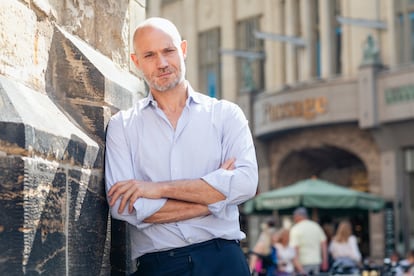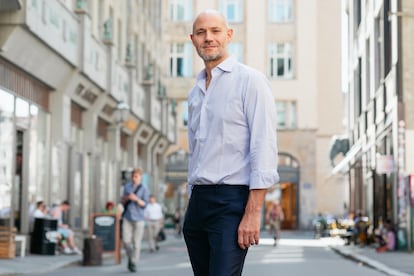Israeli philosopher Omri Boehm: ‘I fear an all-out war that will also make life in Israel impossible’
A speech by the author of ‘Radical Universalism’ at the Buchenwald camp was cancelled in April due to pressure from the Israeli embassy. Now Boehm reflects on the incident and the conflict in the Middle East

It was the first time that Omri Boehm, 46, had returned to Germany after the speech he was to give in Buchenwald to mark the 80th anniversary of its liberation from the Nazis was suspended due to pressure from the Israeli embassy. It was at the beginning of April. Now, in June, he was back at “the scene of the crime.”
In a country still scarred by the Holocaust, any criticism of the Israeli government can be grounds for cancellation. “I’ll be honest, I felt more frustrated than I would have liked,” said the Israeli-German philosopher in a café in the center of the city of Leipzig, where he was participating in Bachfest, the Bach festival. It was not so much the cancellation itself but the lack of reaction in Germany to his speech, published among other international media by EL PAÍS.
It is a sunny day at the end of spring in Leipzig and almost two months have passed since the cancellation of Boehm, a professor at the New School in New York, and author of Radical Universalism; Boehm is also a thinker who claims to be from the school of Enlightenment, of Kant and also of Spinoza.
Tensions in the Middle East had escalated at the time of the interview with Israeli strikes on Iran’s nuclear facilities and Iranian retaliatory attacks on Israel. Born in northern Israel in 1979 and descended from German Jews on his father’s side and Iranian Jews on his mother’s, the conflict felt very personal.

A few days later, the U.S. would intervene, and Boehm would remark: “I fear that the region is heading towards the logic of total war, something that, in the long run, will also make life in Israel impossible.”
During the interview in Leipzig, Boehm returned several times to the same theme: Israel’s survival. “The current violent destruction of Palestine, conceived as necessary to preserve the Jewish state, also means the complete destruction of Israel,” he said. Why? Israel would delegitimize itself with the destruction of Palestine; it could hardly remain “morally, physically or legally intact” and all this would tear the Israeli rule of law to shreds. “Israel will not survive the destruction of Palestine,” he said.
His arguments together with his single state solution to the conflict, including a binational confederation (the Haifa Republic, as one of his essays is called), and accusations leveled at the Israeli authorities of using the Holocaust to whitewash the European far right, led to Boehm having to cancel his speech in Buchenwald.
“On the one hand there is the Israeli government, and the Israeli embassy here, using the memory of the Holocaust to fight human rights and take advantage of the important fight against antisemitism in order to legitimize the politics of the hard right,” he says. “On the other, you have the post-colonial left which, it must be stated clearly, did not take a stand against Hamas’ crimes on October 7 and thought it was a legitimate form of resistance, which I find despicable. And now, in view of the abuse of Holocaust remembrance, it is quick to dismiss this memory as a Western ideology.”
The failure of the moderates
The moderates, what Boehm calls “the Liberal Zionist center” that he identifies with intellectuals such as David Grossman or Eva Illouz, have also failed, in his opinion, because they have taken too long “to speak out clearly against Israeli crimes.” He seeks “a much more nuanced position.” And, actually, quite a lonely one.
Boehm’s Jewish-German grandmother, who lost her parents in the Holocaust and escaped alone to Palestine in 1939 at the age of 16, gave Boehm a taste of the Bildungsburgertum, Germany’s “educated bourgeoisie.” He talked to her about Thomas Mann, Schopenhauer and Wagner. He did his military service, studied at Yale and Heidelberg and in his work he recovered the thread of this German enlightenment destroyed by Hitler’s 12 years of National Socialism.
In Radical Universalism, Boehm rereads and reinterprets three texts (the Declaration of Independence of the United States of America, Kant’s essay What Is Enlightenment?, and the Old Testament narrative of Isaac’s sacrifice) to formulate a defense of universal humanism against “the right [that] fights in defense of traditional values” and “the left [that] fights in defense of gender and race.” But also a defense against “the liberal progressives [...] who have failed to uphold international law, that is, to protect Palestinians from the systematic destruction of the means of subsistence that Israel has sown in Gaza.”
Genocide? “I don’t know,” replies Boehm, who claims the term has come to be used as an ideological weapon and that he prefers to stick to legal definitions.
“It’s become almost impossible to talk and think about it,” Boehm says. “One side accuses you of being a genocide denier; the other, of antisemitism. In my view, there is ethnic cleansing taking place. Crimes against humanity, too. They are horrible crimes (...), and they are no lesser crimes than genocide. But, for many people, those [definitions] are not enough, because the use of the word genocide has become very important to the ideology that seeks to portray Israel and Zionism as genocidal. We must resist this logic. And on the other hand, in Germany, of course, if you use this term, and people may have reason to use it, then you’re antisemitic. As if Jews could not be genocidal. Well, they can be.”
At the end of the conversation in the Leipzig café, opposite the Nikolai-Kirche, where Bach once played the organ, Boehm gave a speech at the Paulinum, the modern and gleaming university church. There he spoke of Bach, music, language, philosophy and cited Maimonides, Adorno, Benjamin and Schopenhauer. The “12-day war” between Israel and Iran, as Donald Trump calls it, had just broken out and during questions he expressed his concern.
A few days later, he wrote in an email: “The [Iranian] regime is dangerous and antisemitic. But there is a tendency to present it as the origin of the conflict in the Middle East.” In his opinion, “the real conflict is not a global and metaphysical one with the Iranians. It’s the local political conflict with the Palestinians.”
Sign up for our weekly newsletter to get more English-language news coverage from EL PAÍS USA Edition
Tu suscripción se está usando en otro dispositivo
¿Quieres añadir otro usuario a tu suscripción?
Si continúas leyendo en este dispositivo, no se podrá leer en el otro.
FlechaTu suscripción se está usando en otro dispositivo y solo puedes acceder a EL PAÍS desde un dispositivo a la vez.
Si quieres compartir tu cuenta, cambia tu suscripción a la modalidad Premium, así podrás añadir otro usuario. Cada uno accederá con su propia cuenta de email, lo que os permitirá personalizar vuestra experiencia en EL PAÍS.
¿Tienes una suscripción de empresa? Accede aquí para contratar más cuentas.
En el caso de no saber quién está usando tu cuenta, te recomendamos cambiar tu contraseña aquí.
Si decides continuar compartiendo tu cuenta, este mensaje se mostrará en tu dispositivo y en el de la otra persona que está usando tu cuenta de forma indefinida, afectando a tu experiencia de lectura. Puedes consultar aquí los términos y condiciones de la suscripción digital.









































